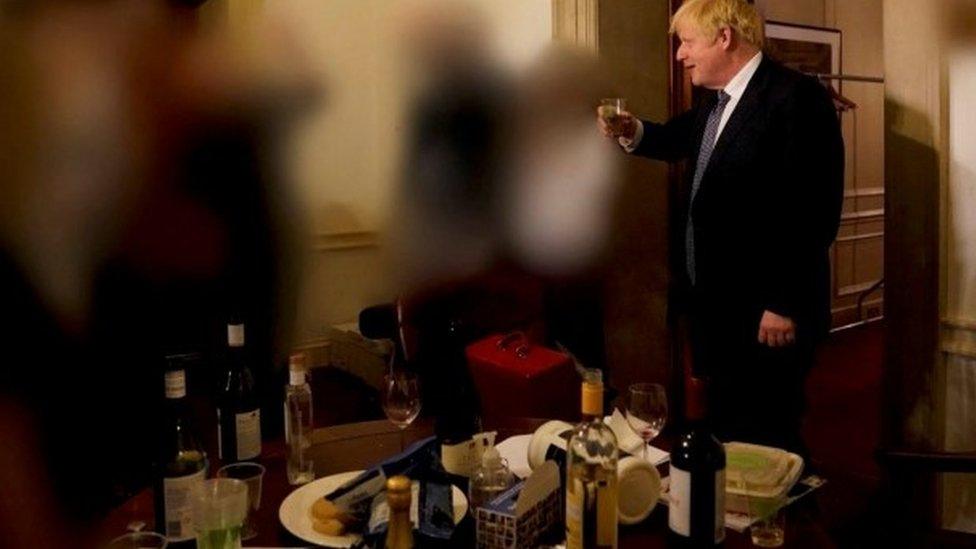Sue Gray: Tory MPs angry over Labour job for Partygate probe chief
- Published

Conservative MPs have expressed anger that Partygate investigator Sue Gray has been offered a job as Sir Keir Starmer's chief of staff.
The civil servant produced a highly critical report into lockdown parties under Boris Johnson that contributed to his downfall as PM.
Labour has insisted it did not approach her until after it was published.
But Mr Johnson said it raised questions over the conclusions over her inquiry, published in May last year.
"I think people may look at it in a different light," he told BBC News.
He added that he "might have cross-examined her more closely about her independence" if "you'd told me all the stuff that I now know".
He added it was "surreal" that MPs investigating whether he misled Parliament over Partygate were planning to take her inquiry into account.
It came after the committee investigating the ex-PM published an update saying it considered her report a "relevant fact" in its probe.
However, Sir Keir rejected Mr Johnson's criticism, saying he was "delighted that respected, professional individuals want to be part of what we are doing in the Labour Party".
He added that the former prime minister should "confront the evidence that is there in front of him," which he said was "pretty damning".
Asked earlier when contact had been made with Ms Gray, shadow chancellor Rachel Reeves said Labour had been looking for a new chief of staff "for the last two or three months".
She added that this was "well after" the civil servant's Partygate report was published.
However, Conservative MP Alexander Stafford, a former ministerial aide to Mr Johnson, said the appointment "doesn't pass the sniff test".
"It really undermines the work that she's done, undermines the civil service and really puts in question Sir Keir's complete judgement," he told BBC Radio 4's Today programme.
Former minister Jacob Rees-Mogg, a cabinet minister under Mr Johnson, has said Ms Gray's Partygate conclusions now looked "like a left-wing stitch up".
Ms Reeves defended the appointment, saying Ms Gray commanded "enormous respect across the political spectrum" and had shown the "highest integrity and standards in public life".
"It was the parties at Downing Street and Boris Johnson's behaviour that got him into trouble, not the person writing the report," she added.
Sir Keir's team appeared to be relaxed about the criticism from Tory MPs, with a source close to the Labour leader saying "it was something we expected".
'Failures of leadership'
The government confirmed on Thursday that Ms Gray has left her position as a senior official at the levelling up and housing department.
Shadow minister Lucy Powell said the Labour would not appoint her until a cooling-off period recommended by the Acoba, the government's appointments watchdog, had passed.
Under the civil service code, officials of Ms Gray's seniority should wait a minimum of three months before taking up outside employment - a period that can be extended up to two years.
Ms Gray, who joined the civil service in the 1970s, became a household name last year when she was appointed to lead an official inquiry into gatherings in government buildings during lockdown.
She was handed the role after Mr Johnson's initial choice to lead the probe, top UK civil servant Simon Case, had to step back after after it emerged an event was held in his own office.
Her report, published in May last year, found that there had been widespread rule-breaking of Covid rules within government, and criticised "failures of leadership and judgement" in Downing Street.
A separate inquiry by the Metropolitan Police led to fines for 83 people, including Mr Johnson himself, for attending law-breaking events.
The findings of Ms Gray's report were cited by a number of Tory MPs during the wave of resignations that eventually triggered Mr Johnson's decision to quit No 10 in July.
Dave Penman, the boss of the FDA union that represents civil servants, said it was "unforgivable" for Tory MPs to question Ms Gray's integrity.
He added that "minister after minister found it convenient to hide behind Sue and her unimpeachable reputation" whilst she was conducting her inquiry.
Alex Thomas, a former official who now works at the Institute for Government think tank, said Ms Gray's appointment was "unusual" and raised "tricky questions for the civil service".
He pointed out that she would not be the first civil servant to take on a political role, citing former diplomat Jonathan Powell's decision to work for former Labour PM Sir Tony Blair.
But he added: "It hasn't happened before with a civil servant who was still serving of this seniority and with the public profile and career history in the deep centre of government that Sue Gray has."
Related topics
- Published25 May 2022

- Published30 June 2023
